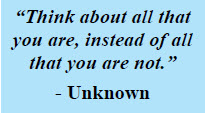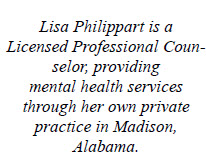 By: Lisa Philippart
By: Lisa Philippart
In my last article, we began to look at some of the habits that keep you feeling insecure. Let’s continue by addressing one of the worst offenders when it comes to the reasons we stay feeling insecure: reassurance-seeking. When you habitually ask for reassurance, you’re really telling yourself that you can’t handle things on your own. Tell yourself that often enough, and you’re going to feel like you can’t handle anything. Obviously, getting reassurance feels good in the moment. For example, when you are feeling anxious or indecisive, outsourcing your decision to someone else relieves you of the anxiety. The real problem with chronic reassurance-seeking is what it does to your confidence in the long term. If you are always using other people to feel better, you’re never learning how to help yourself feel better. My suggestion is to train yourself to tolerate short-term anxiety. How do you do that? I’ll address that another time!
 This may sound strange, but being excessively positive can quickly lead to a lot of emotional insecurity. And the reason is pretty straightforward: Excessive positivity is just denial in fancy clothes. Now, there’s nothing wrong with striving to be cheerful and optimistic. In fact, I think both of those are pretty healthy characteristics. But excessive positivity is different in that it means using positivity as a way to distract yourself from something that is truly bad, negative, or painful. Here’s an example: Your best friend calls you to chat and asks how things are going. Even though you just had a horrible fight with your partner and are feeling awful, you decide to say, “Yeah, things are good!” The problem is that there really is a problem in your life, and by insisting on being positive, you’re putting off dealing with it. In this case, avoiding some genuine social support and compassion from your best friend!
This may sound strange, but being excessively positive can quickly lead to a lot of emotional insecurity. And the reason is pretty straightforward: Excessive positivity is just denial in fancy clothes. Now, there’s nothing wrong with striving to be cheerful and optimistic. In fact, I think both of those are pretty healthy characteristics. But excessive positivity is different in that it means using positivity as a way to distract yourself from something that is truly bad, negative, or painful. Here’s an example: Your best friend calls you to chat and asks how things are going. Even though you just had a horrible fight with your partner and are feeling awful, you decide to say, “Yeah, things are good!” The problem is that there really is a problem in your life, and by insisting on being positive, you’re putting off dealing with it. In this case, avoiding some genuine social support and compassion from your best friend!
I know you are thinking…just because you’re feeling bad and there’s a problem, you don’t have to talk about it. But it’s very easy to get into the habit of always avoiding negative things and insisting on putting on a façade of positivity. Excessive positivity can be a mask, and it’s really hard to trust and be intimate with those who wear masks all the time. If you want to feel less insecure, experiment in small ways with being willing to express some negativity sometimes. You might just find that you feel better for it in the end and, more importantly, establish deeper, more sincere connections to those you love and trust.

 And lastly, I would like to address passive-aggressive communication. Passive-aggressive communication is when you want something but are too afraid of conflict to ask for it directly. This is the worst form of communication because it combines the fear of asking for what you want (passive) with the attempt to control other people (aggressive.) For example, routinely showing up late for work is often a form of passive-aggressiveness because you are trying to get what you want (more time for yourself) without taking responsibility for it and avoiding criticism (“The traffic was awful!”) But like so many of the habits in this article, being passive-aggressive only works in the short term. You may get what you want now, but others will get tired of it and stop playing your game altogether. Passive-aggressive people often end up resentful for not having the courage to be honest and direct with others. And being resentful is not very far from being insecure.
And lastly, I would like to address passive-aggressive communication. Passive-aggressive communication is when you want something but are too afraid of conflict to ask for it directly. This is the worst form of communication because it combines the fear of asking for what you want (passive) with the attempt to control other people (aggressive.) For example, routinely showing up late for work is often a form of passive-aggressiveness because you are trying to get what you want (more time for yourself) without taking responsibility for it and avoiding criticism (“The traffic was awful!”) But like so many of the habits in this article, being passive-aggressive only works in the short term. You may get what you want now, but others will get tired of it and stop playing your game altogether. Passive-aggressive people often end up resentful for not having the courage to be honest and direct with others. And being resentful is not very far from being insecure.
Insecurity isn’t a life sentence. No matter what caused your insecurity in the first place, it’s often the case that subtle habits are maintaining it now. If you can work to identify and eliminate these habits, confidence and self-worth can follow.
By: Lisa Philippart – Licensed Professional Counselor









 June 20, 2025
June 20, 2025



